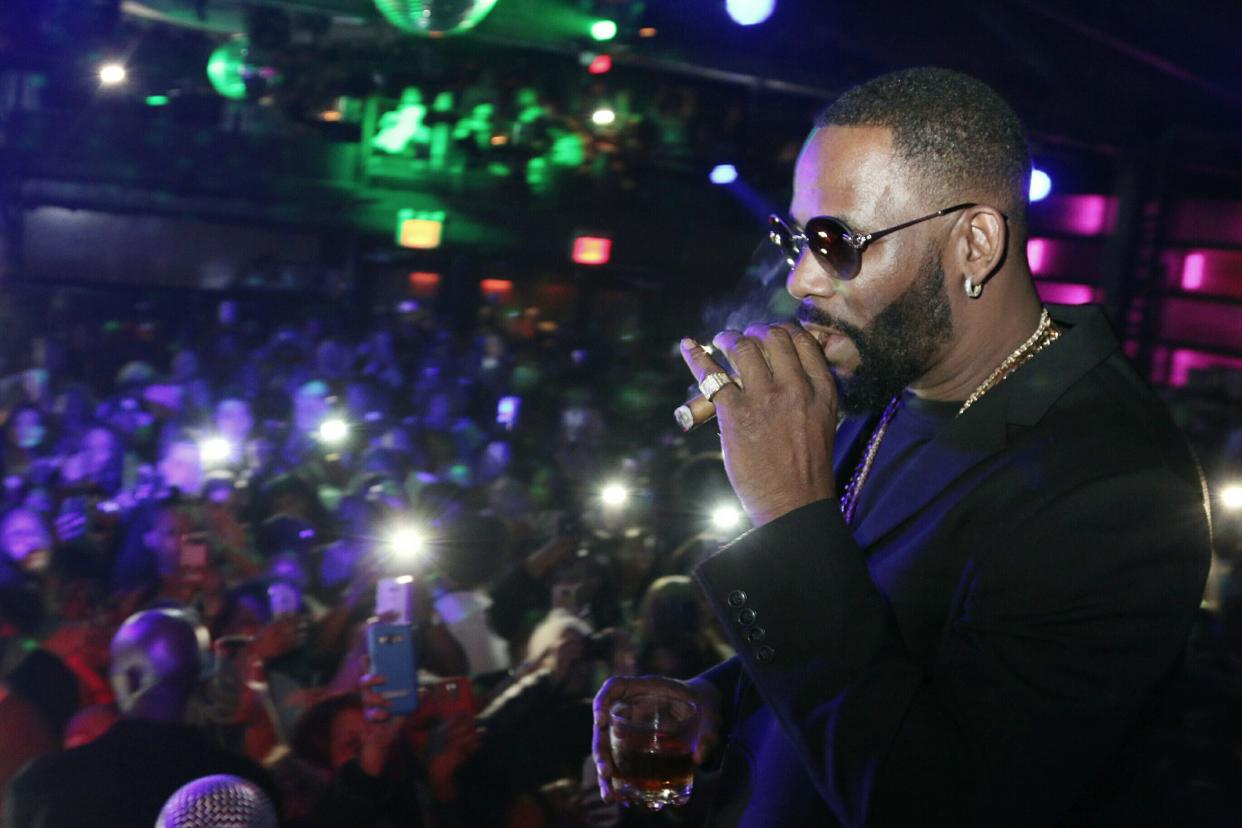R. Kelly Songs Banned From Spotify Playlists Amid His #TimesUp Moment

Rumors and allegations about R. Kelly’s behavior have swirled for years, but lately it seems like his #TimesUp. As social and traditional media pile on the pressure, subscription-based music streamer Spotify said today the R&B star’s songs no longer will be featured on its playlists — though it stopped short of banning his catalog altogether.
The move comes as Spotify puts into place its new “public hate content and hateful conduct policy,” in which the company reserves the right to remove “content that expressly and principally promotes, advocates, or incites hatred or violence against a group or individual based on characteristics, including, race, religion, gender identity, sex, ethnicity, nationality, sexual orientation, veteran status, or disability.” Read its full policy statement below.
A key point in Spotify’s R. Kelly move today is that it is not banning his music from the service but rather refusing to promote it in its popular playlists.
The singer is facing numerous recent allegations of sexual misconduct including relations with underage girls, assault and being the leader of a so-called “sex cult.” A #MuteRKelly campaign in gaining momentum, with such A-listers as Shonda Rhimes, Ava DuVernay and Viola Davis added their heft. Last week Lifetime announced a movie and documentary series focusing on his history of alleged sexual abuse. Both will focus on women who are emerging from the shadows to share their stories about him.
Since breaking out in the early 1990s, Kelly has amassed 14 top 10 albums, including six No. 1s. He also has scored two No. 1 pop singles amid 10 that reached the top 10, though none since 2003. He also has three Grammy Awards — all for the song “I Believe I Can Fly,” which is from the 1996 movie Space Jam.
Here is Spotify’s statement announcing its new policy:
We have tens of millions of tracks on Spotify, growing by approximately 20,000 recordings a day. Nothing makes us more excited than discovering and sharing that music. One of the most amazing things about all that music is the range of genres, cultures, experiences, and stories embodied in it. We love that our platform is home to so much diversity because we believe in openness, tolerance, respect, and freedom of expression, and we want to promote those values through music on our platform.
However, we do not tolerate hate content on Spotify – content that expressly and principally promotes, advocates, or incites hatred or violence against a group or individual based on characteristics, including, race, religion, gender identity, sex, ethnicity, nationality, sexual orientation, veteran status, or disability.
Today, we are announcing our policy on Hate Content and Hateful Conduct. … [H]ere are the basics:
When we are alerted to content that violates our policy, we may remove it (in consultation with rights holders) or refrain from promoting or playlisting it on our service. It’s important to us that our values are reflected in all the work that we do, whether it’s distribution, promotion, or content creation.
At the same time, however, it’s important to remember that cultural standards and sensitivities vary widely. There will always be content that is acceptable in some circumstances, but is offensive in others, and we will always look at the entire context.
To help us identify hate content, we have partnered with rights advocacy groups, including The Southern Poverty Law Center, The Anti-Defamation League, Color Of Change, Showing Up for Racial Justice (SURJ), GLAAD, Muslim Advocates, and the International Network Against Cyber Hate. We also built an internal content monitoring tool, Spotify AudioWatch, which identifies content on our platform that has been flagged as hate content on specific international registers. And we listen to our users – if you think something is hate content, please let us know and we will review it carefully against our policy.
We’ve also thought long and hard about how to handle content that is not hate content itself, but is principally made by artists or other creators who have demonstrated hateful conduct personally. We work with and support artists in different ways – we make their music available on Spotify and help connect them to new and existing fans, we program and promote their music, and we collaborate with them to create content. While we don’t believe in censoring content because of an artist’s or creator’s behavior, we want our editorial decisions – what we choose to program – to reflect our values. So, in some circumstances, when an artist or creator does something that is especially harmful or hateful (for example, violence against children and sexual violence), it may affect the ways we work with or support that artist or creator.
This is our first iteration of this new policy. These are complicated issues, and we’re going to continue to revise our Policy on Hate Content and Hateful Conduct. We’ll make some mistakes, we’ll learn from them, and we’ll always listen to you as we work to keep building the Spotify platform.
Related stories
R. Kelly's History Of Alleged Abuse Is Subject Of Lifetime Movie & Documentary Series
Ava DuVernay, Viola Davis, Shonda Rhimes Add Momentum To #MuteRKelly Campaign
Tencent Music Explores Anticipated Huge IPO For Its Streaming Music Service
Get more from Deadline.com: Follow us on Twitter, Facebook, Newsletter

